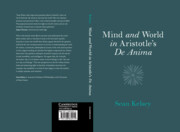
-
Select format
-
- Publisher:
- Cambridge University Press
- Publication date:
- December 2021
- December 2021
- ISBN:
- 9781108966375
- 9781108832915
- 9781108965873
- Dimensions:
- (228 x 152 mm)
- Weight & Pages:
- 0.435kg, 240 Pages
- Dimensions:
- (229 x 152 mm)
- Weight & Pages:
- 0.289kg, 194 Pages
You may already have access via personal or institutional login
Book description
Why is the human mind able to perceive and understand the truth about reality; that is, why does it seem to be the mind's specific function to know the world? Sean Kelsey argues that both the question itself and the way Aristotle answers it are key to understanding his work De Anima, a systematic philosophical account of the soul and its powers. In this original reading of a familiar but highly compressed text, Kelsey shows how this question underpins Aristotle's inquiry into the nature of soul, sensibility, and intelligence. He argues that, for Aristotle, the reason why it is in human nature to know beings is that 'the soul in a way is all beings'. This new perspective on the De Anima throws fresh and interesting light on familiar Aristotelian doctrines: for example, that sensibility is a kind of ratio (logos), or that the intellect is simple, separate, and unmixed.
Reviews
‘Sean Kelsey asks important questions about Aristotle's views on the fit between the mind or soul and the world. How are humans knowers and perceivers? How is the world knowable and perceivable? The proposed answers shed new light on the De Anima and on the methods Aristotle uses to pursue these questions.'
James Warren - University of Cambridge
‘Nearly all of Aristotle is hard. But the ideas and texts at the heart of this book are some of the hard hards. I learned much reading it. This book is a worthy addition to the growing literature on Aristotle’s De Anima.’
Evan Keeling Source: Bryn Mawr Classical Review
Contents
Metrics
Altmetric attention score
Full text views
Full text views help Loading metrics...
Loading metrics...
* Views captured on Cambridge Core between #date#. This data will be updated every 24 hours.
Usage data cannot currently be displayed.
Accessibility standard: Unknown
Why this information is here
This section outlines the accessibility features of this content - including support for screen readers, full keyboard navigation and high-contrast display options. This may not be relevant for you.
Accessibility Information
Accessibility compliance for the PDF of this book is currently unknown and may be updated in the future.


